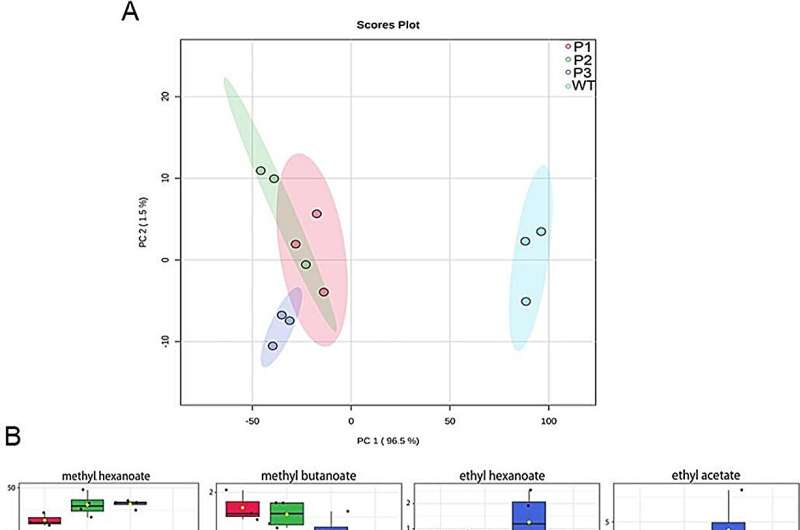This article has been reviewed according to Science X's editorial process and policies. Editors have highlighted the following attributes while ensuring the content's credibility:
fact-checked
peer-reviewed publication
proofread
Unlocking the secrets of strawberry aroma: The crucial role of FanCXE1 carboxylesterase in ester metabolism and ripening

Strawberries owe their distinctive flavor to a complex mixture of sugars, acids, and over 900 volatile compounds, primarily esters, which are produced and degraded by alcohol acyltransferases (AATs) and carboxylesterases (CXEs), respectively.
Despite the importance of CXEs in determining strawberry aroma and fruit quality, their role and regulation during strawberry ripening remain largely unexplored. Nevertheless, it is critical for understanding the molecular basis of volatile syntheses, improving strawberry flavor and consumer appeal.
In April 2022, Horticulture Research published research titled "Strawberry fruit FanCXE1 carboxylesterase is involved in the catabolism of volatile esters during the ripening process."
In this study, the functional characterization of FanCXE1, a strawberry carboxylesterase gene, was conducted using a multifaceted approach combining bioinformatic, biochemical, and molecular biology techniques. Phylogenetic analysis positioned FanCXE1 alongside other plant carboxylesterases, revealing its evolutionary relationships, and InterProScan was used to predict its domain, including the α/β hydrolase fold and the catalytic triad typical of the CXE family.
The gene expression profile was analyzed, showing a marked upregulation during fruit ripening, predominantly in the fruits. In addition, ripening in strawberry fruit receptacles was influenced by hormonal changes, particularly auxins and abscisic acid (ABA), highlighting its responsiveness to the key hormones governing ripening.
The subcellular localization of the FanCXE1 protein, predicted to be anchored to the plasma membrane, was confirmed through GFP fusion experiments, suggesting its linkage to the plasma membrane. Substrate specificity and optimal conditions of the recombinant FanCXE1 protein were determined by enzymatic assays, revealing a higher affinity for longer chain naphthyl esters and establishing its pH and temperature optima.
The function of FanCXE1 was further elucidated through transient silencing in strawberry fruits, which resulted in a significant change in the volatile profile. The transgenic fruits exhibited increased levels of various esters and decreased levels of certain alcohols, suggesting a role for FanCXE1 in the catabolism of volatile ester during ripening.
The study results show that FanCXE1 significantly contributes to the modulation of the ester and alcohol content in strawberries, which affects the overall flavor profile of the fruit.
In conclusion, this research provides a detailed insight into the function and regulation of the FanCXE1 carboxylesterase in strawberries, highlighting its significant role in the ripening process and its potential impact on fruit flavor and quality.
Understanding the molecular mechanisms underlying ester metabolism in strawberries opens avenues for breeding programs aimed at improving fruit flavor and consumer appeal, ultimately promoting healthier eating habits and potentially increasing profitability for strawberry growers.
More information: Félix Juan Martínez-Rivas et al, Strawberry fruit FanCXE1 carboxylesterase is involved in the catabolism of volatile esters during the ripening process, Horticulture Research (2022). DOI: 10.1093/hr/uhac095
Journal information: Horticulture Research
Provided by Plant Phenomics

















